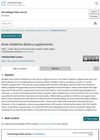 25 citations,
February 2013 in “The journal of investigative dermatology/Journal of investigative dermatology”
25 citations,
February 2013 in “The journal of investigative dermatology/Journal of investigative dermatology” Blocking SCD1 in the skin with XEN103 shrinks sebaceous glands in mice.
 41 citations,
June 2016 in “Reviews in endocrine and metabolic disorders”
41 citations,
June 2016 in “Reviews in endocrine and metabolic disorders” Hidradenitis suppurativa may be related to hormones and patients often have metabolic disorders; more research is needed to understand this connection.
1 citations,
February 2020 in “The Journal of clinical investigation/The journal of clinical investigation” Certain cancer drugs interact with skin bacteria to cause acne-like rashes.
 July 2004 in “Clinics in Dermatology”
July 2004 in “Clinics in Dermatology” The Third World Congress of the International Academy of Cosmetic Dermatology discussed various topics like hair disorders, skin conditions, wound healing, shampoo technology, acne treatment, and the use of lasers in dermatology.
 May 2024 in “Dermatologic therapy”
May 2024 in “Dermatologic therapy” AKN is a chronic scalp condition in African-descended males, treated with topicals, antibiotics, steroids, and sometimes surgery or laser.
 1 citations,
July 2023 in “Frontiers in Immunology”
1 citations,
July 2023 in “Frontiers in Immunology” Oxidative stress and immune dysfunction are linked to both Hashimoto's thyroiditis and polycystic ovary syndrome, with diet and specific treatments important for managing these conditions.
 66 citations,
March 2018 in “British journal of dermatology/British journal of dermatology, Supplement”
66 citations,
March 2018 in “British journal of dermatology/British journal of dermatology, Supplement” An imbalance between certain immune cells is linked to a chronic skin condition and may be influenced by obesity, smoking, and autoimmune issues.
 14 citations,
January 2020 in “Dermatology Online Journal”
14 citations,
January 2020 in “Dermatology Online Journal” Some dietary supplements, like vitamins B6/B12, iodine, whey protein, and muscle-building products, can cause or worsen acne.
 July 2016 in “Journal of Investigative Dermatology”
July 2016 in “Journal of Investigative Dermatology” R-spondin2 may help treat hair loss, gene differences could explain baldness, a peptide's regulation is linked to psoriasis, B-defensin gene copies may affect a skin condition's risk and severity, and potential markers and targets for alopecia areata were identified.
 27 citations,
January 2013 in “Indian Journal of Dermatology, Venereology and Leprology”
27 citations,
January 2013 in “Indian Journal of Dermatology, Venereology and Leprology” PCOS is a complex disorder managed by treating symptoms and requires a team of specialists.
 April 2023 in “Rossijskij žurnal kožnyh i veneričeskih boleznej”
April 2023 in “Rossijskij žurnal kožnyh i veneričeskih boleznej” The document concludes that four related skin diseases, which often occur together, are caused by blocked hair follicles.
 64 citations,
January 2009 in “Gynecological Endocrinology”
64 citations,
January 2009 in “Gynecological Endocrinology” Myo-inositol helps improve skin conditions and metabolic profiles in young women with PCOS.
 9 citations,
April 1976 in “Archives of Dermatology”
9 citations,
April 1976 in “Archives of Dermatology” Iodides can cause skin issues like acne and other health problems.
Early diagnosis and personalized treatment are crucial for managing pediatric androgenetic alopecia.
 6 citations,
March 2009 in “Journal of the European Academy of Dermatology and Venereology”
6 citations,
March 2009 in “Journal of the European Academy of Dermatology and Venereology” Mexican patients had a lower incidence of skin reactions to drugs and no significant link between these reactions and the TNF2 gene variant.
10 citations,
January 1967 in “PubMed” Oral contraceptives often cause melasma and other skin issues.
27 citations,
June 2017 in “Expert opinion on investigational drugs” New anti-acne medications are being tested to offer alternatives to current treatments.
 May 2017 in “Journal of Investigative Dermatology”
May 2017 in “Journal of Investigative Dermatology” 10% carbamide peroxide is safe and effectively reduces mild to moderate acne.
 4 citations,
January 2002 in “Annals of Dermatology”
4 citations,
January 2002 in “Annals of Dermatology” Androgenetic alopecia, or hair loss, is most common in people in their 30s, can start early, is often inherited, and may be influenced by factors like hormones and scalp health.
 19 citations,
February 2018 in “Nutrients”
19 citations,
February 2018 in “Nutrients” Certain zinc transporters are essential for healthy skin and managing zinc in the body could help treat skin problems.
 4 citations,
January 2019 in “PubMed”
4 citations,
January 2019 in “PubMed” Patterned hair loss in women is linked to hormonal imbalances and biochemical changes, and should be evaluated for underlying health issues.
 61 citations,
June 2016 in “Clinical Medicine”
61 citations,
June 2016 in “Clinical Medicine” PCOS is often linked to insulin resistance and obesity, and weight loss can improve symptoms.
 35 citations,
October 2006 in “Journal of Dermatology”
35 citations,
October 2006 in “Journal of Dermatology” Teen hair loss common in boys, linked to family history and mild symptoms.
 1 citations,
January 2001 in “Drug and therapeutics bulletin”
1 citations,
January 2001 in “Drug and therapeutics bulletin” The document concludes that management strategies for PCOS are important due to its common occurrence and associated health risks.
 June 2021 in “Health and Society”
June 2021 in “Health and Society” Healthy lifestyle changes, especially weight loss, can improve symptoms and overall health in people with Polycystic Ovary Syndrome, especially if they are overweight or obese.
 88 citations,
June 2016 in “Human Reproduction Update”
88 citations,
June 2016 in “Human Reproduction Update” New hormonal contraceptives are safer, have fewer side effects, and offer health benefits for women.
 7 citations,
June 2020 in “Journal of Cosmetic Dermatology”
7 citations,
June 2020 in “Journal of Cosmetic Dermatology” Turkish women with hirsutism experience lower quality of life, especially those with PCOS, regardless of hair growth severity.
 48 citations,
July 2002 in “Journal of Cutaneous Medicine and Surgery”
48 citations,
July 2002 in “Journal of Cutaneous Medicine and Surgery” Skin problems are common and important signs of eating disorders and treating the eating disorder can improve these skin conditions.
January 2019 in “Springer eBooks” Sebaceous glands play a key role in skin health and conditions like acne.
 21 citations,
January 1988 in “Stress Medicine”
21 citations,
January 1988 in “Stress Medicine” Stress affects skin health and emotional well-being should be considered in skin disease treatment.

























